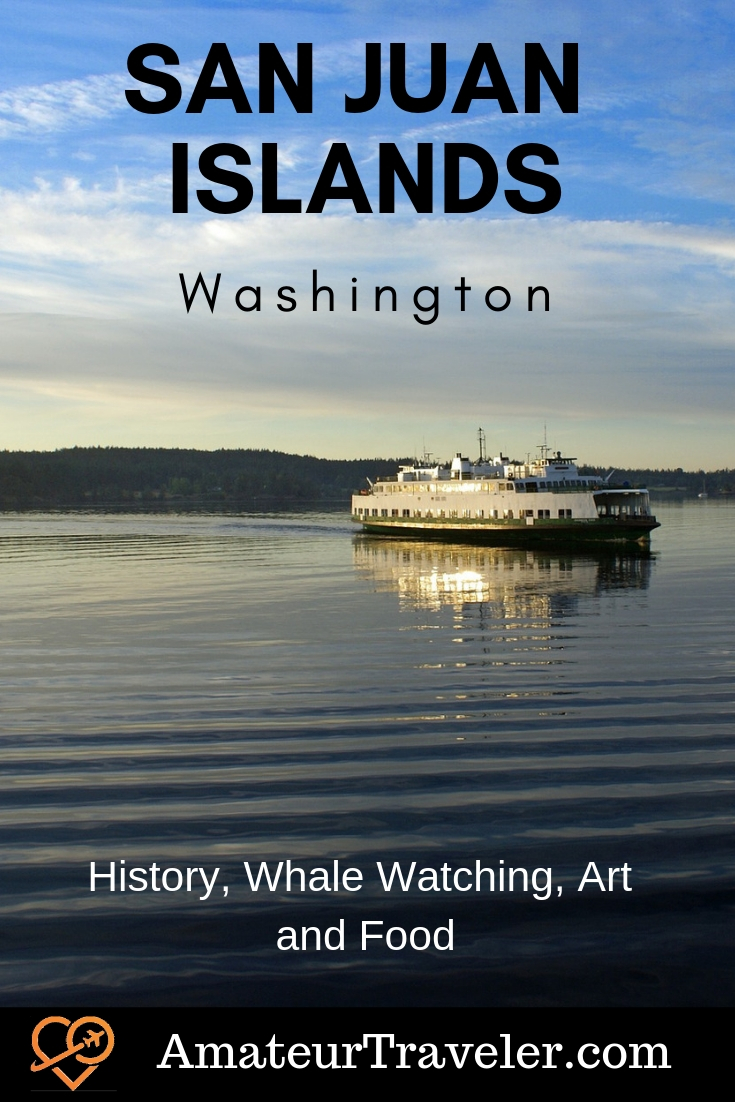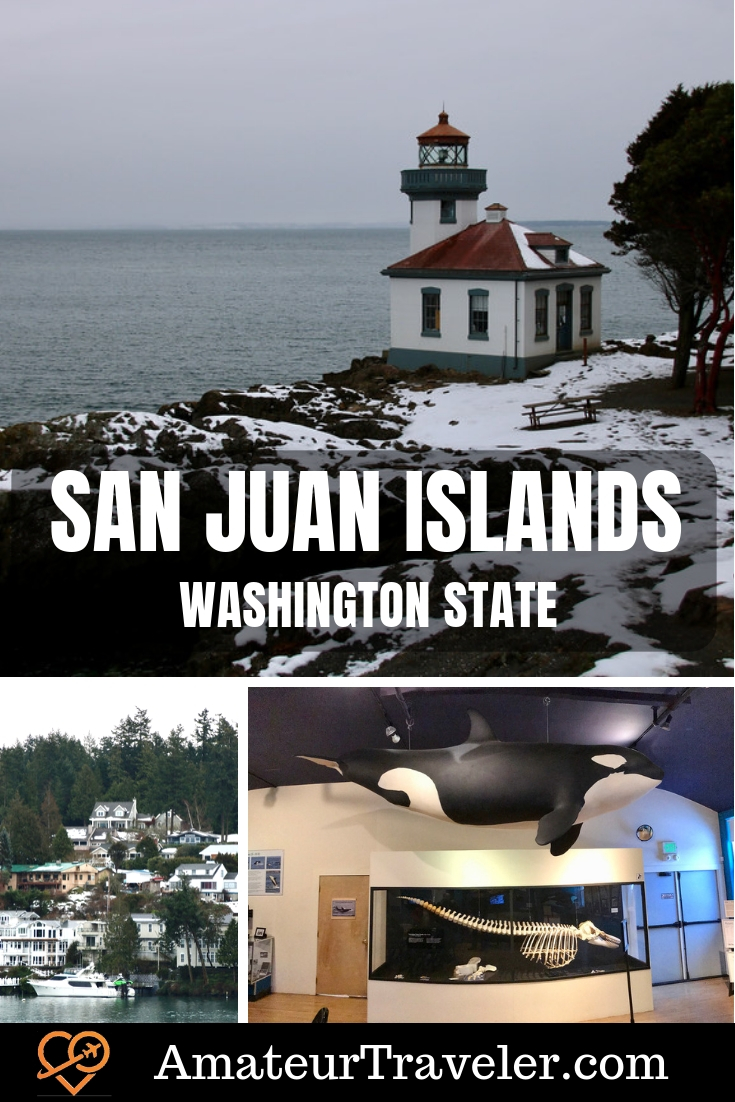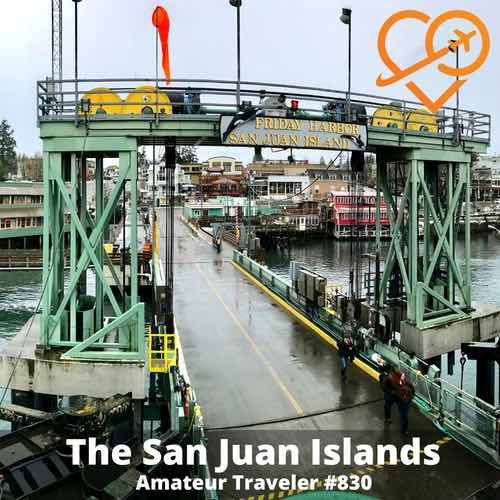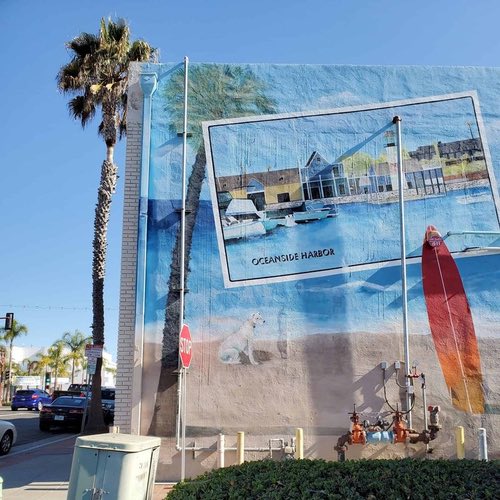The San Juan Islands are a quiet cluster of islands just outside of the rush of daily life. They are a place where you can watch the whales, learn some history, enjoy some art, and wave at Canada. And the USA and Great Britain nearly went to war over them… because of a pig.

Before considering what to do in the San Juan Islands, let’s put it on the map. The San Juans are a series of 172 named islands near Seattle, in the Salish Sea just outside of the Puget Sound. On a clear day, you can see the Cascade Range, the Olympic Range including Mt Baker on the mainland, and Vancouver Island.
Table of contents: ()

San Juan Islands History and National Historic Park
Are the San Juan Islands part of Canada or the U.S.?
While we were driving on the west coast of San Juan Island, TMobile sent me a text message that said: “Welcome to Canada!”… which was a bit odd, because I was still in the United States. But the confusion was understandable as I was barely in the U.S. when I was in this upper left corner of the continental U.S. I was only 9 miles from Victoria, British Columbia.
The confusion over whether the San Juan Islands is part of Canada or the United States dates back to the treaty of Oregon in the 1840s. Part of the platform that President Polk ran on was to settle the border between Canada and the United States. Polk wanted to claim much of what is now British Columbia by setting the border at the latitude 54º 40′. He ran on the slogan “54º 40′ or Fight!” Eventually, a compromise was reached and the 49th parallel was agreed on as the border but with one exception. Since the city of Victoria on Vancouver Island was below that latitude, they made an exception for that island. They made the border “the strait between Vancouver’s Island and the mainland”.
But, there are two straights between Vancouver Island and the mainland, and in between the two are the 172 islands of the San Juans. And because of this oversight, the U.S. and England (Canada was still part of England) nearly went to war in 1859… over a pig.
San Juan Islands History and the “Pig War”
The Hudson Bay Company was licensed by England to set up farms on San Juan Island… since England considered it part of their Canadian territories. Americans also set up farms on San Juan Island… since the U.S. considered it part of its Oregon Territory. One American farmer, Lyman Cutlar, shot a pig that was eating his vegetables. The pig’s owner Charles Griffin, who worked for the Hudson Bay Company, wanted to see Cutlar face English justice. Cutlar and his fellow Americans sent word to the American garrison on the mainland that there was an Indian uprising on the island, please send in the army.
While that was an obvious lie, Captain George Pickett was dispatched with 66 soldiers to establish a camp on the island. Later a Confederate General, Picket would be best known for an ill-fated charge at the Battle of Gettysburg. Pickett had his Lt Henry Roberts build a redoubt and position canon overlooking the Hudson Bay farm and the south end of the island. Lt Roberts also went on to become a general in the Civil War and later the chief engineer of the U.S. Army. It was there that he published what he is best known for, “Robert’s Rules of Order”.
The English dispatched warships and the U.S. sent more soldiers to the island. The U.S. and English had already fought 2 wars in the last 75 years and this could easily have been the third. At one point the U.S. had 461 soldiers and 14 cannon and the English had 5 warships with 70 cannon and 2,140 men. The governor of Vancouver Island, James Douglas, ordered the British commander to attack, but he refused. He said that “two great nations in a war over a squabble about a pig” was foolish.
General of the Army and hero of the Mexican American War Winfield “Fuss and Feathers” Scott was dispatched from Washington all the way around Cape Horn in South America to come to this isolated corner of what might or might not be the United States. He and Douglas were able to reach a compromise where each side agreed to limit the number of soldiers on San Juan Island to 100 each and to put off resolving the border issue until later. Later turned out to be 1872 when it was finally arbitrated by Kaiser Wilhelm I of Germany in favor of the U.S. claim. The only casualties of the “Pig War” were caused by accidents or suicides in this remote outpost.
San Juan Island National Historical Park
You can still see evidence of the American Camp and the English Camp as both are now part of the San Juan Island National Historical Park. The American Camp still commands views over the southern part of the island while the English Camp was created later after the compromise so they chose a charming spot on a protected bay.
Pickett’s quarters are still at American Camp. This is a building that he moved over from Fort Bellingham on the mainland.
When the National Park service evaluated the San Juan Islands in the 1960s to determine if there should be a National Park in the area, it was actually recommended to make this entire archipelago a national park because of its wildlife and scenic beauty.
Wildlife and Whale Watching in the San Juan Islands
The island still boasts deer, foxes, rabbits, and bald eagles but it is probably best known as a place to spot whales. There are 3 resident pods of Orcas that range around these waters. J, K, and L pods are extended families of whales. Unlike the transient Orcas which roam in smaller groups and tend to eat other marine mammals, resident Orcas eat predominantly salmon. They are endangered because of water pollution and because of a decrease in the salmon populations.
Whale Museum in Friday Harbor
You can learn much more about these whales as well as the many other types of whales that visit the area on a whale watching trip or at the Whale Museum in Friday Harbor. The Whale Museum is particularly well set up to introduce these majestic animals to kids.
- Search for Great Tours HERE
- Get a Car Rental
- Buy Travel Insurance
- Book Your Accommodation HERE

They also keep track of the latest sightings of whales in the area. You can even adopt your own orca through the museum.
Whale Watching Tours in the San Juan Islands
Numerous whale-watching cruises leave from Friday Harbor on San Juan Island, especially in the busy summer months. Some of these will guarantee that you will see a whale or you will get credit for a future cruise. The peak months for being able to see whales is June – September when you will have about a 90% chance.
Best Whale Watching on San Juan Island – Lime Kiln State Park
A popular spot on the shore where you can spot whales is from the lighthouse at Lime Kiln State Park. We have friends on the island who have seen whales swim by so close that you could see down their blowholes.
The park is named after the lime mining industry that happened here and elsewhere on the island. They would mine limestone and then refine it in large kilns and then ship it in boats… which is a bit tricky and it tends to burn if you get it wet. More than one boat filled with lime burst into flame and sank.
Other Things to do in the San Juan Islands
Only 4 of the San Juan Islands have ferry service: San Juan Island, Orcas Island, Lopez Island, and Shaw Island. The rest of the San Juans can be visited by boat including state parks like Turn Island State Park which is not far from Friday Harbor. Some smaller islands are wildlife reserves and are off-limits.
Pelindaba Lavender Farm
San Juan has a Lavender Farm where you can see and smell fields of lavender growing… unless of course, you go in winter as we did. The farm hosts the San Juan Island Lavender Festival in mid-July.
Wineries and Cidery
All 3 of the larger islands have wineries:
- San Juan Island has San Juan Vineyard which is located close to Friday Harbor.
- Orcas Island has Orcas Island Winery.
- Lopez Island has Lopez Island Vineyards.
San Juan Island has the Westcott Bay Cider cidery near Roche Harbor.
Things to do in Friday Harbor
San Juan Island has the only incorporated town in the San Juans which is Friday Harbor. Friday Harbor has less than 3,000 people and the whole island has less than 7,000 people, but there is a thriving art scene on the island. If you are shopping for art from local artists check out Island Studio on Spring Street for a wide selection.
San Juan Islands Museum of Art
Friday Harbor boasts a nice small art museum, the San Juan Islands Museum of Art, that highlights the work of local artists.
San Juan Community Theatre
We had a chance to see a local theatre production while we were in Friday Harbor. It was a showcase performance for local playwrights and we were impressed with both the acting and writing talent on the island.
The best place for a live performance is the San Juan Community Theatre which has both a main stage and a small black box theatre that would be the envy of many much larger cities.
Where to Eat
Downriggers – Friday Harbor
We ate at Downriggers which is on the harbor near the ferry terminal in Friday Harbor. It boasts some great appetizers including a roasted cauliflower with a zingy hot sauce. We sampled the Buddha Bowl and spicy Prawn Mac and Cheese from the mains and loved both. See menu (appetizers, soups and salads, mains and seafood, kid’s menu).
Lime Kiln cafe – Roche Harbor
Roche Harbor, on the northeast corner of San Juan island, is where the well-to-do park their yachts. The Lime Kiln cafe provides a surprisingly down to earth and tasty menu for both the well-to-do and the hoi polloi like me.
Brandon, one of the park rangers at the San Juan Island National Historical Park, recommended we try the Cubano which he claimed was the “best” he every had. I support his declaration. It has restored my faith in the Cubano as a sandwich and as an art form. We also liked the fried chicken sandwich, Marie Cristo (basically a french toast sandwich) and the fries.
Getting Here – San Juan Island Ferries
While it is possible to take a small plane to San Juan Island, most visitors will arrive on the daily ferry service from Anacortes, Washington (see Anacortes / San Juan Islands ferry schedule) or from Victoria, British Columbia (not in winter, see Anacortes / Sidney B.C. ferry schedule).
In the busy summer months, you will absolutely need a reservation for the ferry. We visited in February when we were able to drive up at 12:05 pm and get on a 12:10 pm ferry. The 12:10 pm ferry left very promptly at 12:10 pm. You pay to take the ferry to the island but not to take it back. You can bring a vehicle or travel as a pedestrian on the ferry.
While locals will complain about the reliability of the Washington State Ferry System, we found the trip to be smooth and efficient. You can get food on the ferry including hot food, which is a good thing for those of us who were making a last-minute dash to get on.
In the summer months, there are two ferries a day from Friday Harbor that can take you to nearby Victoria on Vancouver Island which can make it easy to add a day trip to the city as part of your visit.
I should say that when you head back to the mainland, locals will call that heading back to “America”… so maybe it is still unclear if the San Juans are part of the country or not.
When to Visit the San Juan Islands
From the snow in my pictures, you can guess that I visited in winter which is the quiet offseason. The island usually doesn’t get much snow in the winter. Summer is the peak season when hotels in San Juan Island will fill up and you will need to plan a bit further in advance.

+Chris Christensen | @chris2x | facebook
One Response to “Things to Do in the San Juan Islands – History, Art, Food and Whale Watching”
Leave a Reply
Tags: article, san juan islands, washington













 Whale Watching in Monterey California
Whale Watching in Monterey California Travel to the San Juan Islands and Whidbey Island – Episode 830
Travel to the San Juan Islands and Whidbey Island – Episode 830 Mission San Juan Bautista – California
Mission San Juan Bautista – California Oceanside CA Things To Do: Surfing, Shopping, History and Food
Oceanside CA Things To Do: Surfing, Shopping, History and Food

Luke - GSE Solutions
Says:February 22nd, 2019 at 2:40 am
This is fantastic! I will be checking out Downriggers when I touchdown in the San Juan Islands on my business trip with GSE Solutions. Thanks for the inspiration! Luke